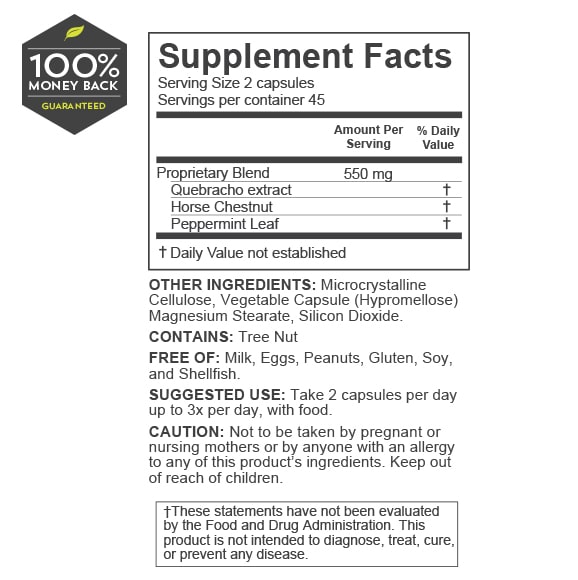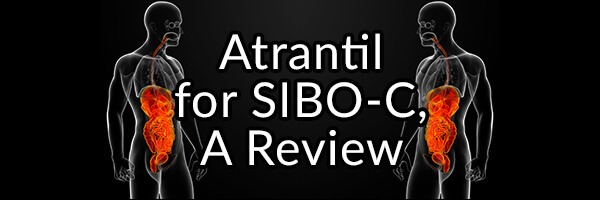Atrantil is a supplement that may help people suffering from SIBO-C (small intestinal bacterial overgrowth with constipation) or methane (archaea) dominant SIBO.
I have done a lot of research into this supplement to see if it can live up to its promise to help; you overcome SIBO-C. Many of my clients have used Atrantil with great success, and if you search the Facebook groups for reviews of the supplement, most of them are positive. My research uncovered some pros and cons associated with the supplement. So what are archaea, and why would you want to reduce their colonies if you are suffering from SIBO-C?
All About Archaea and The Issues They Cause When Dysbiotic
Many different microorganisms make up your intestinal microbiome, including bacteria, archaea, yeast, parasites, and viruses. Archaea are different than bacteria; they are single-celled organisms that lack a nucleus. Archaea in our digestive system feeds off of hydrogen that bacteria produce during fermentation within our gut. Archaea then produce methane as a metabolic byproduct under anaerobic conditions. The more hydrogen gas that is produced from fermentation by a dysbiotic bacterial microbiome, the more methane archaea will produce. Cows flatulate more methane than humans because they consume fermentable foodstuff (grass, for example) in larger quantities and have more archaea by volume in their digestive systems. Most of the available research on archaeal dysbiosis comes from bovine research and studies. If archaea dysbiosis occurs in cows, it can lead to severe gas bloat syndrome, and they can have a gastrointestinal rupture and die unless the gas is relieved. Rarely, a trochar and cannula have to be inserted into the cow’s digestive tract to relieve the pressure. Methanobrevibacter smithii seems to be the most dominant of the archaea species in our gut, compromising at least 90% of our archaea flora.
Decreased motility and upper gut dysbiosis (hydrogen-producing bacteria within the upper gut, produce hydrogen further up our digestive tract that feeds the archaea and allow their colonies to grow) have been correlated with an overgrowth of archaea within the digestive tract. Decreased motility leads to gastroparesis and constipation, leading to slower transit time and increased fermentation. Motility in our digestive tract comes in waves that are controlled by the migrating motor complex. Decreased motility leads to an increase of hydrogen and methane concentrations within our gut, which causes excessive bloating since the body does not have mechanisms to quickly eliminate large volumes of those gasses. People with archaeal overgrowth are also more likely to have a reduction of serotonin produced by their microbiome within the digestive tract, further slowing motility. The following study concluded: “Compared with hydrogen producers, methane producers had significantly lower postprandial serotonin levels. These data—although derived from a very small (N=18) study—suggest that methane-producing IBS patients have reduced postprandial serotonin.” Serotonin (5-HT3/5-HT4) is one of the neurotransmitters produced in our gut and is associated with regulating proper gut peristalsis by triggering intestinal muscular contractions. Lower amounts of serotonin in our gut equates to lower motility because of less muscular contractions that would explain the cause of chronic constipation in methane dominant SIBO. Lowered activation of 5-HT3 receptors in the ileum significantly slows down emptying of the small intestine, allowing for more colonies of bacteria to remain and grow which may lead to dysbiosis.
It is more difficult to relieve archaeal dysbiosis because they tend to be more antimicrobial-resistant and form thick biofilms. Many conventional antibiotics fail to reduce archaeal overgrowth. Thankfully Atrantil works in multiple ways to alleviate archaeal dysbiosis.
So What About Atrantil and How Can It Help Relieve Archaea Dysbiosis?
I had to dig deep into its possible patent to figure out Atrantil’s proposed mechanism of action. I also reached out to Dr. Brown so that he would provide his explanation of why Atrantil works. I will post the information that I found and some of my interview with him to help you determine if this supplement is right for you.1
What I found was promising in theory, but there was not a lot of human in vivo studies of two of the main ingredients:
- Red quebracho tannins (150 milligrams of quebracho extract)
- Saponins possibly obtained from horse chestnut

Red Quebracho Tannins
Red quebracho is a tree that is found in South America and is a natural source of tannins. Tannins are water-soluble polyphenols that are found in plants and can be quite bitter. Tannins can also bind to proteins and therefore enzymes as well. Conventional sources of tannins in our diet are berries, beer, chocolate, nuts, smoked meat, tea, and wine. Tannins are very astringent, so when we consume a food or beverage that contains them, our mouth becomes dry, and we pucker our lips. Tannins are an important ingredient in the process of tanning leather. Tannins help to break down hide protein structures, making them more durable and also stains the leather. Tanbark from the quebracho tree is still in use today in tanning processes. Saliva in our mouth inactivates tannins reducing their ability to interfere with endogenous digestive enzymes and digestion.
Tannins are used in Atrantil to bind, shrink proteins that bacteria produce, and reduce the populations of both protozoa that may be in the gut and methanogenic archaea. It is possible for different bacteria/archaea to be resistant to the antimicrobial effect of tannins; it is unknown if it will work or not with your type of dysbiosis. Tannins in theory, in a few in vitro studies, and ruminant in vivo studies can inhibit archaea significantly and seem promising in helping people with SIBO-C.2 3 4 5 6 7
In the interview with Dr. Brown; he mentioned the mechanism of action for the tannins was:
The tannins “Form covalent hydroxyl bonds that bind to free hydrogen.”
He later goes on to state that:
“The Archaebacteria (a methanogen) require hydrogen for methane synthesis. By binding to the free hydrogen, the Polyphenol removes much of the fuel source for methanogenesis.”
Tannins also bind to dietary fiber during digestion, reducing its fermentation. Less hydrogen produced from fermentation would cause a further reduction in archaea leading to hopefully improved motility. Tannins also have an antimicrobial effect against many hydrogen-producing bacteria which may further help to relieve upper gut dysbiosis as well.8
Finally, Dr. Brown mentions the antibacterial properties of the tannins:
“The polyphenol binds to and weakens the cell wall of the archaea and bacteria, disrupting the integrity of the “S” layers of the cell wall.”
Breaking off those layers weakens the archaea to the next ingredient in the supplement.
Horse Chestnut
Saponins (that I believe are from horse chestnut) are the next ingredient in Atrantil.
Horse Chestnut is a type of tree that is found throughout the world in temperate climates. Its use is mainly known for increasing vascular health from a compound found in the seed of the tree known as aescin. A Saponin is a class of plant compounds that are known to have soap-like foaming actions.9
Dr. Brown mentioned in the interview about the anti-archaea properties of saponins in Atrantil:
“The polycyclic peptide’s amino acids target receptors on the cell wall of the bacteria; form pores by preventing cell wall synthesis resulting in lysing of the bacterial cell.”
He also mentions that the saponins can reduce methane production by the archaea itself:
“Second, the saponin, penetrates the compromised cell wall of the archaea and bacteria (by the flavonoid). Once inside of the archaea, the saponin binds to methyl-coenzyme M reductase halting methane production within the archaea itself. This prevents the metabolism of the known methanogen and halts methanogenesis.”
There are studies to back Dr. Brown’s claims in ruminant animals and in vitro studies.10 11 12 13
Peppermint Oil
Peppermint oil in the supplement is an antispasmodic agent and slows down motility so that the other ingredients have more time to reduce archaeal dysbiosis. I wrote about menthol extensively in Fix Your Gut and on my blog.
Peppermint is a hybrid mint plant. It is a cross between watermint and spearmint. Peppermint is native to Europe, but the herb has now grown widely throughout the world. People everywhere value mint for its strong pleasant scent, its cooling sensation on our skin, and its flavoring capabilities in baking, candy making, and drink preparation.
Peppermint has a long tradition of herbal use and is used by the Egyptians, Greeks, and the Europeans for medicinal purposes. Peppermint has been studied intensively for its use in the treatment of IBS and other intestinal disorders. Peppermint works very well for pain relief, reduces intestinal spasms, and can reduce hemorrhoids.
I believe peppermint oil is a double-edged sword for SIBO-C. Dr. Brown thinks that it would slow down motility in the small intestine so that the saponins and tannins can do their job efficiently. It does, however, concern me that slowing motility can cause further digestive issues in some people with SIBO-C. Generally, with SIBO-C, you want to increase motility, not decrease. If Atrantil works the way that it is proposed to, the brief motility reduction should eventually be overcome by reducing archaeal overgrowth. Proper serotonin production in the intestines by re-establishing proper flora should occur, relieving constipation and restoring motility. All of this being said, for some people, Atrantil can worsen their constipation further, and if that happens for more than two to three weeks while you are taking the supplement, I would recommend discontinuing it. The peppermint oil in the supplement might be causing more issues by worsening constipation then it is helping.
Atrantil Final Verdict
I like Atrantil. Will it work for everyone with SIBO-C? Maybe not. But I do recommend it to some of my clients that I feel would get the most benefit from its uses who have SIBO-C. I have seen it improve their symptoms in most recommended cases.
I do appreciate the openness of Dr. Kenneth Brown in our e-mail communications and his interview. He does believe in his product and believes that it will improve people’s lives who are suffering from SIBO-C.
That being said, I do have some small reservations that I mentioned in the above review. I wish there were more human clinical trials with Atrantil and people suffering from SIBO-C. Dr. Brown, however, has published two studies on the use of Atrantil in people suffering from SIBO-C. The first study, published in 2015, was double-blind placebo-controlled and lasted for two weeks. In the study, sixteen people, mainly females who had IBS-C for years, were randomized into two groups. Eight received the supplement Atrantil, and eight received the placebo. After two weeks, the people that were taking Atrantil had remarkable improvements in motility and bloating and those taking the placebo showed no improvement. The first study yielded a reported 88% success rate. Atrantil’s second study lasted two weeks and included twenty-four subjects (again, mostly women). The study was published in 2016 and, unlike the last study, was not a double-blind placebo-controlled study. After two weeks, twenty-one of the twenty-four subjects reported improvements in bloating, abdominal pain, digestion, and constipation, yielding a reported 88% success rate. In both studies, no side effects with the supplement were reported. Atrantil per the studies seems to work well for women; we need more studies to see if it also works well for men that are dealing with SIBO-C or IBS-C.14 15
Finally, Dr. Brown mentions in his Atrantil study that the supplement might help people who are suffering from SIBO with diarrhea as well. “It is possible that the blended extract could also be utilized in patients with IBS-D who have also been diagnosed by breath test with SIBO. Sachdeva et al found that there was a statistical link between patients with IBS-D, female gender, and bloating that was also a predictor of SIBO in effected populations. Therefore, it is possible that the tannins in the blended extract could act as a sink for hydrogen ions generated by invasive bacteria in the small bowel of IBS-D patients. There is also data to support the use of peppermint oil for abdominal pain in this population. It is unknown what effect, however, saponins Conker Tree Chestnut would have on diarrheal symptoms. This would have to be tested clinically in IBS-D patients with SIBO.“16
Even with my minor criticisms, I recommend that people consider Atrantil if they are suffering from SIBO-C. I have recommended it to many of my clients with mostly successes. Therefore, you should ask your healthcare professional about using it to improve your digestive health.
- http://www.google.com/patents/US20140141108 ↩
- http://www.google.com/patents/US20140141108 ↩
- https://www.google.com/url?sa=t&rct=j&q=&esrc=s&source=web&cd=5&cad=rja&uact=8&ved=0ahUKEwjm3JnUoM3JAhXE6yYKHUKUA8oQFgg-MAQ&url=http%3A%2F%2Fwww.ncbi.nlm.nih.gov%2Fpubmed%2F9759559&usg=AFQjCNGzw_WGxQRkr_fIoXRWlYeuC0OVEQ&sig2=PR-VS4PXi6tsWX4WZZur2g ↩
- http://poisonousplants.ansci.cornell.edu/toxicagents/tannin.html ↩
- http://www.ncbi.nlm.nih.gov/pmc/articles/PMC3941959/ ↩
- http://www.ncbi.nlm.nih.gov/pubmed/19841214 ↩
- http://www.ncbi.nlm.nih.gov/pubmed/17468433 ↩
- https://atrantil.com/wp-content/uploads/2016/08/Atrantil-JGHR.pdf ↩
- https://nccih.nih.gov/health/horsechestnut ↩
- http://www.ncbi.nlm.nih.gov/pubmed/22925153 ↩
- http://www.google.com/patents/US20140141108 ↩
- http://www.ncbi.nlm.nih.gov/pubmed/24063817 ↩
- http://www.ncbi.nlm.nih.gov/pubmed/25846054 ↩
- http://ghrnet.org/index.php/joghr/article/view/1299 ↩
- https://www.ncbi.nlm.nih.gov/pmc/articles/PMC4986399/ ↩
- http://ghrnet.org/index.php/joghr/article/view/1299 ↩







Is it okay to take digestive enzymes with atrantil? It’s been great for the gas and bloating I was having but still am not having enough bowel movements. I think I need help with my digestion. Thanks! (I can’t find this answer anywhere)
Unfortunately Atrantil made me feel lousy. Constipated, bloated, just terrible. I think it also binds up iron? I’m anemic.
I wish there were more options for methane/SIBO-C. Flagyl used to help, now it doesn’t seem to do anything.
I’m sulphur intolerant, but if I tough it out and try a few days of a garlic/Allimed supplement. My GI magically starts moving on it’s own again.
I can’t find that other med for methane, forget the name, can’t get it anyways.
Let me know if there are any other options for SIBO-C and methane I may have not heard of?
I also feel upset stomach. I’ve been taking it for two weeks. I have two treatment left to see if it improves
neomycin and refaximin or partially hydrolyzed guar gum with rifaximin:
or Atrantil
and/or prucalopride at bed time, Have a look, good luck.
Get your doctor to prescribe Rifaximin. It is helping me with SIBO-C. I am taking it with digestive enzyme, and Allimed.
I took a breath test that showed elevated methane levels and thus tested positive for methane SIBO (hydrogen was totally negative).
My only real complaint is acid reflux. I don’t get bloating and I wouldn’t say I’m constipated either. I am maybe a bit more gassy than your average guy. I just get reflux 4+ hours after eating and it’s usually really mild. It’s typically in bed that I get it. I roll over in my sleep and it boils up.
Eating a low carb diet seems to stop the reflux. I am 32 and not overweight. Non smoker.
Given these clues, would you say my issue is sibo? What would be the best way to resolve it?
Methane can coexist with h pylori. If doctor hasn’t diagnosed coexisting condition, I doubt Atrantil will fix it:
Helicobacter pylori infection is associated with high methane production during lactulose breath test
https://www.ncbi.nlm.nih.gov/pubmed/27608906
” CONCLUSIONS: This study shows for the first time, a significant association between H. pylori infection and methane production, suggesting that H. pylori might influence gut microbiota composition.”
https://www.ncbi.nlm.nih.gov/pubmed/30302165
“Small intestinal bacterial overgrowth (SIBO) may coexist with Helicobacter pylori infection, which can be the cause of chronic gastrointestinal complaints.”
Functional 13C-urea and glucose hydrogen/methane breath tests reveal significant association of small intestinal bacterial overgrowth in individuals with active Helicobacter pylori infection
https://www.ncbi.nlm.nih.gov/pubmed/27586816
Hi John,
I have been following your blog for a long time. Previously misdiagnosed LPR and finally I was able to test and confirm SIBO. Now I’ve figured out it’s SIBO-C and methane predominant. Did a 2 week course of rifaximin, 50% effective only but made constipation worse and 4 weeks symptoms returned.
I have been supplementing with 5-HTP as I do have naturally low serotonin (based on personal experiences) and it REALLY helped the motility. I am also using Iberogast, herbal motility drops and using Atrantil as of 2 days ago. My bowels are moving better than a year.
Do you think it’s safe if I supplement 5-HTP with Atrantil and Iberogast together? I haven’t had any negative effects yet although I’m only 3 days in.
I really like the effect of 5-HTP on my mood, concentration etc as well.
When do you think it might be safe to start weening off? As in should I only do the Atrantil for 2 weeks and stop, and continue with the others? And should I continue those motility supplements for life?
Thanks so much for your insight!
I have known people that have supplemented all three, of course run all my advice through your healthcare professional. Depends, I would say at least give in a couple of weeks. After that reduce the Atrantil dosage to half and see how are you doing.I would not recommend taking the motility supplements for life, because if you have to rely on them, then did you truly fix your gut?
I used to be prescribed itopride hydrochloride(Ganaton 50) and a digestive enzyme and was told to take them whenever I feel bad which is always. Can I take them along with Atrantil?
I took one pill yesterday and have had severe heart palpitations and severe anxiety with profound fatigue. I have slept for over 20 hours or more. I cant get rid of the off and on heart palpitations. It feels like my heart physically hurts, like its physically trying to punch its way through my chest. This medicine is evil for me.
I took this and my hand swelled up. It was ok with one a day but more than that caused swelling. Do I have a histamine intolerance?
It would appear to me that you are having a localized allergic reaction to any of the ingredients in Atrantil, I would discontinue it and consult your doctor.
Hey John,
I have IBS-C and i have GERD. Would Atrantil be suitable for me?
Hi, I would like to understand of there are good alternatives to Atrantil for Sibo-c?
Wich are the best antimicrobial for Sibo-c ? For methane and Hydrogen production,as Atrantil?
thanks for this, it was helpful
Hi, I have SIBO c and I am using Atrantil now for the second week. I need something to help with the motility! The gas in my stomach or intestines gives a severe pressure to my heart and head. I feel dizzy and have headache. I did not hear this from somebody else!
https://fixyourgut.com/sibo-methane-or-hydrogen-dominant-what-is-the-difference/
I get the exact same thing. It’s awful. Doctors think they aren’t related, but it absolutely is.
H2S hydrogen sulphide SIBO can cause your symptoms, check out trio-breath test online. New test for H2S, and methane, H2 gases. Just came out
Low sulphur diet
Dr Nirala Jacobi as reference
Hi John thanks for your work. Do you work with people with Interstitial Cystitis? (tied to SIBO in the medical literature). A lot of supplements bug my bladder, including essential oil type things that are high in salicylates-but I do have SIBO-C and gut infections (parasites, bacterial overgrowth as ID’d on GI Map and Parawellness) so I know I need to address in addition to SIBO
Thank you
M
Yes, I have coached people who have suffered from IC.
I have SIBO-C and IC, and I use a supplement called Bladder-Q with great results for my IC.
I think that you are absolutely correct with your concerns about Atrantil slowing motility. I just finished a course of Rifaxamin and Flagyl for methane dominate sibo, and just to insure that it didn’t come back I have been taking it in the days following the antibiotic treatment. I don’t have any gas at all, however, my food is not digesting. I believe that it has caused a sort of gastroparesis. I can feel a fullness and tightness in the bottom of my stomach and I am constipated. Of course having had SIBO I am freaking out, hoping and praying that this isn’t a sign that it has come back. But I definitely can feel something NOT good since starting this. I think that I will back off for awhile and see if the symptoms abate. As always, thank you for the info.
I just got my 2 bottles of Atrantil. Their customer service is outstanding.Question will these herbs take away any Hpylori with it?Also does it kill any good bacteria? Thank you, John! PS.I have only taken 2 doses but at least I can say, I have had NO side effects (and I have GP) so slowing not bad, and the herbs did not bother my gastrtis, or liver so far so good!
John what dose of 5-HTP should I take? I have 50mg Jarrow brand.It did make me nauseas, the night I took it.But trying to fix my gastroparesis and sibo-c. Mayo said I didnt have sibo from breath test.But with GP and constipation, I’m sure I do.The bloating is out of hand.Can I take 5htp with the Antrail?Thanks John xxoo
Yes, Ava you can take it together but if it is making you sick on the stomach it may not be right for you at this time.
Love your review, very informative! I have been on Atrantil for about 3 weeks now after my doctor recommended that I try it. I have IBS-C with bloating and constipation symptoms and have noticed a significant reduction in my bloating. I was on a probiotic and was told to not take the probiotic for about a week after starting Atrantil since they may interact with each other but have started taking it again with no issues.
I ordered mine off of Amazon with a coupon code my doc gave me if you want to share it with your readers, MYGUT008. I was told the coupon code works on the Atrantil website too.
Is it possible that abdominal pain is due to the toxicity of archaea death? thanks.
Hi John
Thank you for your in depth and informative information. My son is about to try Atrantil for suspected SIBO-C and we’re not sure whether we need biofilm disruptors alongside this. I had been thinking of using a prokinetic agaent, but based on what you’ve written above it seems that this might intefere with the intended action of Atrantil. Any comments would be very welcome. You mentioned that the newest edition of your book has Atrantil added to the SIBO protocol, but I can’t find this.
Many thanks
https://fixyourgut.com/sibo-methane-or-hydrogen-dominant-what-is-the-difference/
Is this something taken short-term as with an antibiotic, or continual as with supplements? Thanks
Have you had any clients have any side effects with Atrantil? I also wanted to share that my doctor recommended it and gave me a $5 off promo code: MYGUT008 to use on Amazon or Atrantil.com.
I think I might be a strange case. I have a seriously-distended stomach (think 6-7 months pregnant). Aside from my appearance and the ways my clothes fit, I have NO constipation, NO diarrhea , no stomach distress at all. I have had this for about 2 years, but had to back-burner the issue, due to a cancer diagnosis. I eat primarily plant-based, lots of legumes, cruciferous veggies, leafy vegetables, etc…A recent visit to the GI doc revealed his diagnosis of SIBO. Everything I have read about dietary implications of treating SIBO pretty much flies in the face of what I eat for the cancer. I am very reluctant to go “meat, dairy, beans/sulforaphane -free” etc…
Which brings me to why I was exploring Atrantil….Is it conceivable that it could just reduce the bloating, since it seems designed to target SIBO-C? Is it reasonable to assume that I wouldn’t have to alter my diet as drastically if I took the Atrantil?
Any insight you can lend would be greatly appreciated! I have been researching for answers for 3 days nonstop! Thank you in advance.
TERRIBLE PRODUCT – AND THE DR. AND WEBSITE READS OFF PRESCIPTED APP.
this shit has made my life a total misery and cost me nearly 200.00 extra bucks in going to have 2 colonics !
If you have IBS-C go take some Immodium- it’s basically acts the same way for ppl with monitory problems !
This is the WORST product I have ever tried and the doc that formulated it and his staff don’t give a hoot- and as said it’s all PRESCIPTED!
Most Def. A scam website and product
Buy at ur own risk with ibs -c
BAD BAD PRODUCT- if you want to have a good BM in a week – by all means take it !
Good luck – Vince
Interesting, I am sorry you had a bad response to it. I have not coached anyone with that much of a reaction. Most people either do well or it does not make that much of a difference. Any supplement or medicine can definitely go wrong.
My Dr. RXed Atrantil after a course of Rifaxamin did Nothing for my Methane Gas SIBO. After 3 – 4 months of Atrantil……still NO lessening of Abdominal Bloating/Distention. Appear 6-7 months pregnant (just guessing….never been pregnant). Absolutely NO abdominal pain since SIBO appeared one year ago or any side effects from the Atrantil. Atrantil along with lots of probiotics, digestive enzyme, supplments and a very strict SIBO protocol diet have done NOTHING for me. I’ve been constipated all my life. Gastroenterologist identified a “redunant colon” 2 colonoscopies ago. Still now only have bowel movements every 3 – 4 days…….unlike typically up to easily 1 week or more in past.
Getting very weary of this……:(
https://fixyourgut.com/sibo-methane-or-hydrogen-dominant-what-is-the-difference/
Hello
To def acknowledge that the peppermint oil to be problematic as far as motility, it definitely impedes it! Helped the gas and bloating to a degree , however I’m still getting urges to poop and usually I cld get that IBS relief from a BM nothe so with Atranti.
Rt now I feel constipated and can’t have a BM currently – i did have 3 during the night – it cld be just that tenemus- just miserable condition.
It’s been ruining my entire life and I suffer from a rare bleeding disorder, that’s a walk in the park compared to this Sibo / IBS -C issue
I’m considering using gutpro with atrantil. Would this be wise? Just eradicated h.pylori about a month ago with the triple therapy treatment.
I see no issue with this. I would take a low dose hours away from it.
Hi John,
Should Atrantil be used INSTEAD of your suggested regime for SIBO-C (as explained here:) or in ADDITION TO it? Or some mix of the two? I’ve just ordered a bottle of the Atrantil and some HCl + Pepsin tabs. I already have Digestive Bitters (Better Bitters Semisweet from Herb Pharm). Should I add in the InterFase and another anti-microbial?
My symptoms typically present as constipation, bloading, burping, and rumbling sounds after I eat (I’m assuming gas) — if that makes a difference.
Thanks for your insight!
Holly
In addition to it for a lot of people. Maybe Interfase or diluted NOW cinammon bark oil would help.
A mix of the two, the newest addition of my book has it added to the SIBO-C protocol. Interphase plus may help to reduce biofilm that the hydrogen bacteria produce if you have overgrowth of it feeding the archaea.
Hi, greetings from Peru, first of all congratulations for your excelent blog, you really help us. I have methane SIBO, and my sister who lives in US is sending me Atrantil, its coming in the next days. Im usually taking domperidone , do you think that i can use Domperidone while im taking Atrantil? Thats because domperidone moves your gut. Thanks already for the answer.
This “trial” is going well! I have tried a myriad of remedies for two years to get my digestion in order. In 10 days (2 pills three times a day) I have noticed monumental changes, including an increased motility that I haven’t had in probably 5 years. At least for me this product borders on miracle cure!
Thanks for this.
Are samples of this medication provided? I was diagnosed with IBS in 1984 and have been on several medications for it, I am currently on Donnatel. I am very interested in this medication.
I do not know if there are samples of the supplement Atrantil. You can contact them here: http://atrantil.com/contact-us/.
Hi John. Thank you for the review.
My 2nd SIBO test (as of last week) returned a mild-moderate case of both elevated hydrogen and methane levels. About half of the time (when I eat things like cheese) the bowels are more C, but the other half (when I eat higher fodmap i.e. squashes, nuts), they are not D, but softer, loose.
My question is this: If I have both elevated Methane and Hydrogen levels, and both mild C and D, is Atrantil a wise choice to include in a 2nd herbal antibiotic regimine (along with allimax, neem, berberine, cinnamon, which my FM doctor has me on?). Your perspective would be appreciated.
Thank you.
So this could theoretically help with gerd too then right?? =)
If your Gerd is caused by archaea overgrowth and slow motility, possibly. The peppermint oil may relax the LES too much and exasperate symptoms.
Ok John thanks. Yes I think I will be giving this a shot at some point. Still taking bifido max and galactomune now. Its funny how I went from having ibs most of my life to having GERD instead and I hardly have cramping anymore from everything ive learned through the process
John, about your GERD, I read a study where they found that Bifidobacterium animalis caused severe duodinitis in Interleukin-10-deficient mice.
https://www.ncbi.nlm.nih.gov/m/pubmed/19235917/
There are several substrains of B. animalis so it’s not outside the realm of possibility that one of them is in the probiotic you are taking and causing your issue. Just something to possible investigate.
http://m.nootriment.com/bifidobacterium-animalis/#
“Bifidobacterium animalis, or B. animalis, is known by a few different names, which can make it confusing when shopping for a probiotic formula containing it.
Part of the confusion is because another Bifidus bacteria called bifidobacterium lactis (B. lactis) was merged with B. animalis when their DNA were sequenced and found to have an overwhelming number of similarities.”
what is the diff between sibo c and d? I have the methane type. thankyou!
Most of the time methane dominant archaea overgrowth is SIBO-C or SIBO with constipation.
Have you had any clients use it for SIBO-D?
No, and it is not recommended for SIBO-D yet. SIBO-D is a different entity compared to SIBO-C so absorbing methane and limiting archaea, would not help much.